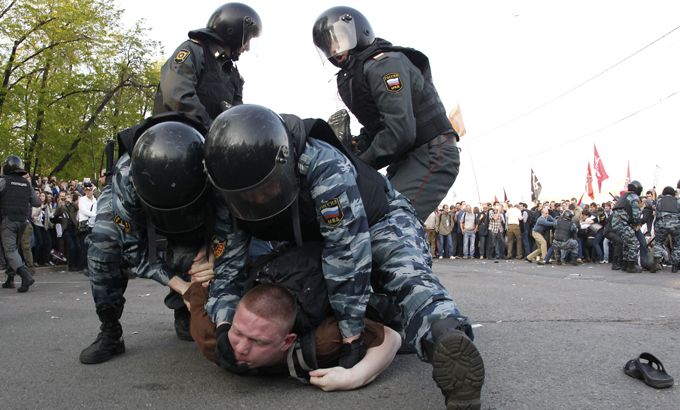Hundreds held in Putin inauguration protest
Police in Moscow clash with protesters opposed to installation of president-elect, taking at least 400 into custody.

Baton-wielding and helmeted police have clashed with tens of thousands of protesters taking part in a demonstration against Monday’s inauguration of Vladimir Putin, Russia’s president-elect, arresting at least 400 in Moscow.
Those arrested on Sunday included Alexei Navalny, the anti-corruption crusader, liberal leader Boris Nemtsov and ultra-left wing activist Sergei Udaltsov.
The three men are key leaders of the nascent protest movement against Putin, who served as president and prime minister before he was re-elected in March.
Police said they detained the protesters after they threw stones and water bottles at officers and blamed the violence on opposition leaders who attempted to stage a sit-in protest in the middle of the crowd.
Earlier, reports said at least 20,000 opposition protesters took part in the demonstration, which had been billed as a “March of Millions”.
The protesters marched shouting “enough lies” while helmeted police, using batons, beat back dozens of mostly young protesters at the event across the river from the Kremlin.
The turnout appeared smaller than most of the winter’s unprecedented wave of protests, some of which attracted crowds estimated at 100,000 or more.
National parliamentary elections were marred by fraud, but Putin won the vote easily and another round in March, returning to the Kremlin seat he held in 2000-2008.
Some of the demonstrators acknowledged that Putin’s election win and his inauguration have been a blow to morale.
“It’s true that some have been disappointed,” said Yuri Baranov, a 46-year-old information technology specialist. But “the most important thing is that people have awakened”.
Others admitted some doubts about whether the protests would spur any long-term change.
“I would like to think that our voice will be heard, but I am not totally sure of this,” said Yelena Karpsova, 47, who came to the rally from Tula, about 200km south of Moscow.
Rival demonstrations
Supporters of the ex-KGB spy meanwhile planned to hold a gathering with some 50,000 people.
A senior city official said Putin’s group did not need permission to bring out such large numbers onto a public square because “what they will be having is not a rally or a march or a protest”.
“It will be a mass cultural event,” Alexei Mayarov, a Moscow regional security department head, told Russian news agencies.
|
“What is important is there is still a constituency, and the most modernised constituency in Russia, that does not see Putin as a desired president“ – Maria Lipman, political analyst |
Organisers said the demonstration along a main Moscow thoroughfare towards Bolotnaya Square opposite the river from the Kremlin was to conclude with a meeting that city authorities officially limited to 5,000 people.
“It’s called the march of millions and I suspect they wish they had not named it that name because it’s going to be interesting to see just how many people do turn up to this protest,” Al Jazeera’s Sue Turton reported from Bolotnaya Square.
“They have got permission for 5,000 people to congregate in Bolotnaya Square, but the march starts further across Moscow and then they will walk here and then congregate and later on … move to another square next to the Kremlin and have some sort of sit in overnight until the inauguration.
“Now we don’t even know how many people would contemplate doing that. There has definitely been a wane in the momentum of the protest movement,” she said.
Maria Lipman, a political analyst from the Carnegie Endowment for International Peace, told Al Jazeera from Moscow: “The rally that has been authorised implies that 5,000 will take part. Maybe more can be expected, however not the many tens of thousands that we saw in Moscow streets and squares in December, February and March.”
Protests ‘on decline’
“The mass protests are maybe losing momentum and may be on decline, however what is important is there is still a constituency, and the most modernised constituency in Russia, that does not see Putin as a desired president.
“I think that part of society will not reconcile to the fact that Putin holds power for the next six years, and we may see more eruptions of discontent in the following years over various kinds of developments,” she said.
Putin’s return to the presidency will technically give him greater powers than he previously wielded as prime minister.
He has dismissed the allegations that widespread fraud helped him win the presidential election and secured victory for his United Russia party in a parliamentary poll in December.
The inauguration ceremony will include a booming 30-gun salute and a special blessing from Orthodox Church Patriarch Kirill.